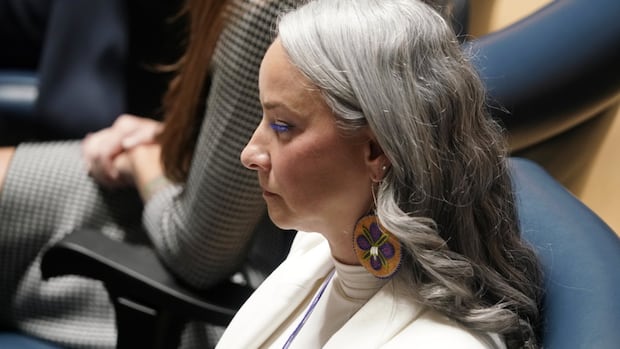As Winnipeg police continue to investigate fires and acts of vandalism at the constituency offices of two MLAs in recent weeks, some political science experts worry the incidents will deter Indigenous women from seeking public office over safety concerns.
On Tuesday — the National Day for Truth and Reconciliation — Families Minister Nahanni Fontaine’s constituency office in West Kildonan was hit by fire. The blaze came just over a week after the office’s windows were smashed.
The North End constituency office of Housing Minister Bernadette Smith has seen four fires since August.
Winnipeg police’s major crimes unit is investigating the blazes at both offices. Officials have not confirmed whether they believe the fires were intentionally set.
Kelly Saunders, a political science and gender studies professor at Brandon University, fears the recent fires and vandalism at the offices of Fontaine and Smith — the first two First Nations women cabinet ministers in Manitoba’s history — could have a “chilling effect” on current and future representation in the Legislature.
“When young Indigenous girls see their role models, people like Bernadette Smith, Nahanni Fontaine, being targeted, being harassed, being subjected to violence, seeing their constituency offices targeted in this way, it does the opposite of encouraging young girls to see politics as a possible career path for them,” Saunders said, calling the incidents “gender- and race-based violence.”
Saunders says such incidents send a message that “politics is only the domain of certain groups of people,” with marginalized groups, particularly First Nations and Indigenous women, vastly underrepresented.
In Manitoba, nearly one in five residents are Indigenous, underscoring the importance of First Nations, Métis and Inuit representation within the legislature, Saunders says.
“It’s not just about getting more Indigenous women into politics because it’s good for Indigenous women. It’s good for all of us to have that diversity of perspectives and opinions and lived experience within cabinet, within caucuses, within legislative buildings,” she said. “It ends up in better policy and better programming and better laws.
“This should matter to all of us, regardless of our particular ethnic identity or community that we belong to.”
At an unrelated funding event on Thursday, Fontaine said she and Smith won’t be intimidated out of politics, stressing “no amount of attacks will ever, ever push us out of this.”
On Thursday, Smith called the fires and vandalism an “attack on democracy” that makes representatives less accessible to the constituents they serve. Fontaine said the incidents were an “attack on community” that will continue to affect her for the rest of her life.
Lori Turnbull, a political science professor at Dalhousie University in Halifax, said attacks on constituency offices are a type of dual violence hurting politicians and the people they serve.
“The constituency office is a public space — that’s where the person meets their constituents, does work on behalf of their constituents. That’s an act not only of violence against the person … but it’s also an act of violence against the public,” Turnbull said.

She says fires and vandalism make members of the public feel like the office of their local MLA isn’t safe to visit. With less access to their elected representatives, constituents’ voices may go unheard, she says.
Sarah Nickel, an associate professor at the University of Alberta and Canada research chair in Indigenous politics and gender, says the alleged attacks on the offices of First Nations women MLAs are “attacks on representation itself.”
“These are patterns of intimidation that Indigenous women leaders have long faced, being punished, harassed, threatened for taking up any kind of political authority or having any kind of political voice,” said Nickel, who is a member of the Tk’emlúps te Secwépemc near Kamloops.
“Fire and vandalism … it’s not just property damage. These are things that are carrying symbolic weight as acts that are meant to instil fear and drive Indigenous women out of public roles.”

Nickel says Indigenous women were long excluded from holding public office, including in chief and council positions. That didn’t change until 1951 after revisions to the Indian Act, she said.
That historic exclusion has “long roots” that made the fires and vandalism at the offices of Fontaine and Smith unsurprising to Nickel, she says.
Saunders says she was also unsurprised but disappointed by the incidents, pointing to a growing sense of hostility within Canadian politics. She fears there would be “copycat situations” if the perpetrators of the alleged vandalism aren’t caught.
“I think we have to be really clear on drawing lines around what is appropriate freedom of expression and appropriate modes of protest,” she said. Anything that crosses over into targeted acts of violence should not be allowed in our country.”







